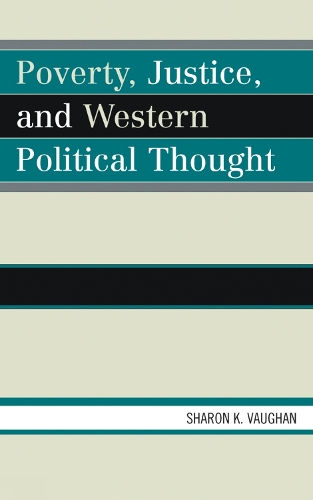
Poverty, Justice, and Western Political Thought
(Paperback)
Publishing Details
Poverty, Justice, and Western Political Thought
By (Author) Sharon K. Vaughan
Bloomsbury Publishing PLC
Lexington Books
16th May 2009
United States
Classifications
Professional and Scholarly
Non Fiction
362.501
Physical Properties
Paperback
234
Width 154mm, Height 235mm, Spine 17mm
358g
Description
The number of people who live in poverty has always far exceeded the number who do not. The normative question of how governments ought to treat the poor goes to the heart of the idea of justice and thus it is an essential element of political theory. Yet, there has been no formal study of the treatment of poverty in Western political thought. The chapters ofPoverty, Justice, and Western Political Thought include an analysis of the main arguments of Plato, Aristotle, Locke, Rousseau, Smith, Mill, Tocqueville, Hegel, Marx, Rawls, and Nozick about the causes, effects, and solutions to the problem of poverty and how their treatments of poverty relate to the idea of a just society. This book asks: What is the relationship between poverty and justice in the state If we are to understand the relationship between the poor and the idea of a just state in the tradition of Western political thought, then we must be able to recognize how these theorists' definitions, assumptions, and conclusions about poverty contribute to or detract from the idea of justice. At the core of this work is the claim that the demands of justice necessarily entail that the political theorist engage with the problem of poverty, with the goal being to suggest some thoughtful and reasonable approaches to the problem.
Poverty, Justice, and Western Political Thought demonstrates that historical analysis and reconstruction of the treatment of poverty is critical because we are part of a historical community. Rather than being artifacts of scholarship, philosophical debates and ideas that are hundreds and thousands of years old continue to be relevant today because they are part of the foundation for society's beliefs about who the poor are, why they are poor, and what responsibility, if any, society has to them.
This book will benefit political theorists and philosophers interested in the history of political thought, poverty, or distributive justice, as well as non-theorists.
Reviews
This book is quite readable and informative. . . . Vaughan presents political theorists with a badly needed study on a topic seldom addressed in the mainstream. Any serious theorist should pick up this book as soon as he or she gets a chance. * H-Net: Humanities and Social Science Reviews Online *
Inquiry specifically into the concept of poverty, and the treatment of poverty as a problem for political philosophy, is much less common than more general treatments of distributive justice in contemporary scholarship, which is why this volume is welcome... Recommended. * Choice Reviews *
Author Bio
Sharon K. Vaughan is assistant professor of political science at Morehouse College.
